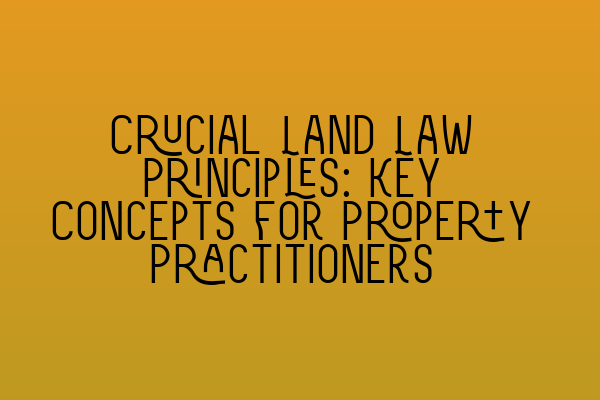Crucial Land Law Principles: Key Concepts for Property Practitioners
As a property practitioner, understanding the key principles of land law is crucial for providing effective advice and representation to your clients. Land law forms the foundation of property law, and its principles govern the rights, obligations, and interests associated with land ownership. In this blog post, we will explore some of the fundamental concepts of land law that every property practitioner should be well-versed in.
The Concept of Land
Land, in legal terms, encompasses not only the physical surface of the earth but also everything attached to it, above it, or below it. This includes buildings, trees, minerals, and airspace. The concept of land ownership is central to property law, and it is important to have a clear understanding of the nature and characteristics of land.
To deepen your knowledge on the concept of land, I recommend reading our related article on SQE 1 Practice Exam Questions.
Property Rights and Interests
Land law recognizes various property rights and interests that individuals can hold over land. These include freehold estates, leasehold estates, easements, and restrictive covenants. Understanding the different types of property rights and interests is essential for advising clients on their property transactions and resolving disputes.
For a comprehensive review of property rights and interests, take a look at our article on SQE 1 Practice Mocks FLK1 FLK2.
Registration of Land
In many jurisdictions, including the UK, land registration systems have been established to provide a clear and reliable record of land ownership. Registration of land grants legal recognition and protection to the rights and interests associated with the land. As a property practitioner, you should be familiar with the registration process and the implications it has on property transactions.
For a detailed understanding of land registration systems, check out our informative article on SQE 2 Preparation Courses.
Tenant’s Rights and Obligations
Tenancy law plays a significant role in land law, and understanding the rights and obligations of both landlords and tenants is crucial for property practitioners. Key concepts include the distinction between leases and licenses, rent payment obligations, and eviction procedures. Knowledge of tenant’s rights and obligations will enable you to better advise clients regarding their landlord-tenant relationships.
For a comprehensive review of tenant’s rights and obligations, I recommend our article on SQE 1 Preparation Courses.
Land Disputes and Resolution
Land disputes often arise due to conflicting claims, boundary disputes, or breaches of property rights. Resolving these disputes requires a solid understanding of land law principles as well as effective negotiation and advocacy skills. By familiarizing yourself with the key concepts of land law, you will be better equipped to address land disputes on behalf of your clients.
To stay updated on the latest SRA SQE exam dates, refer to our article on SRA SQE Exam Dates.
Conclusion
Mastering land law principles is essential for property practitioners. By understanding the fundamental concepts, you can provide effective advice, draft enforceable contracts, and represent your clients’ interests in property matters. Continuing education, like our SQE preparation courses, can further enhance your knowledge and expertise in land law.
Feel free to reach out to SQE Property Law & Land Law if you have any questions or require assistance with your property law matters. We are here to help!
